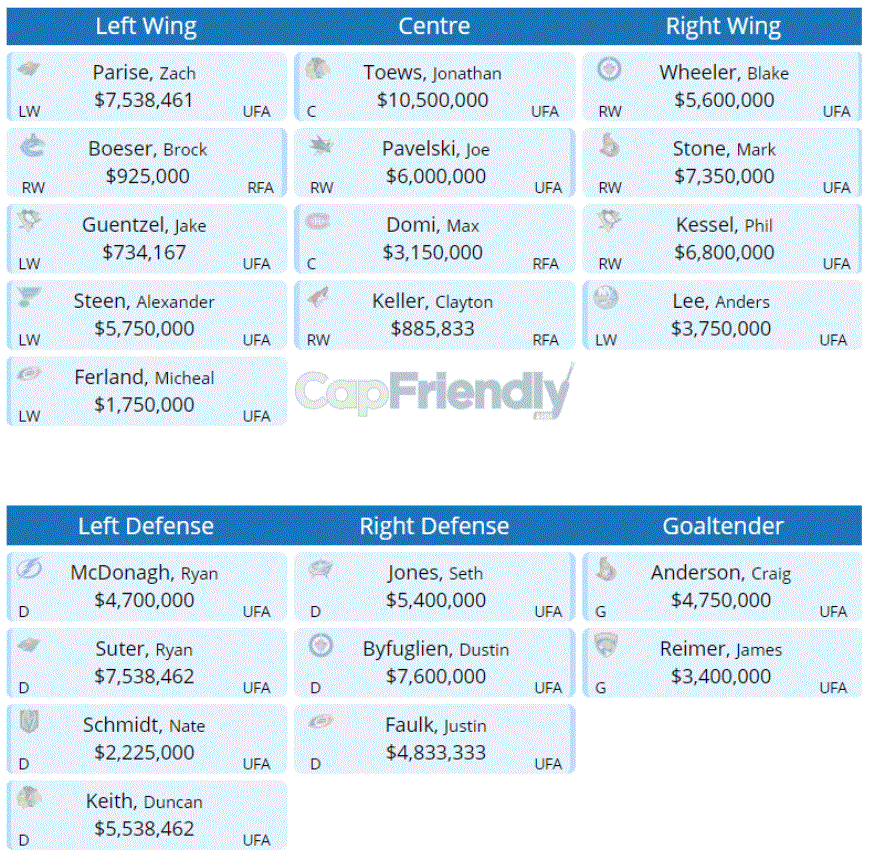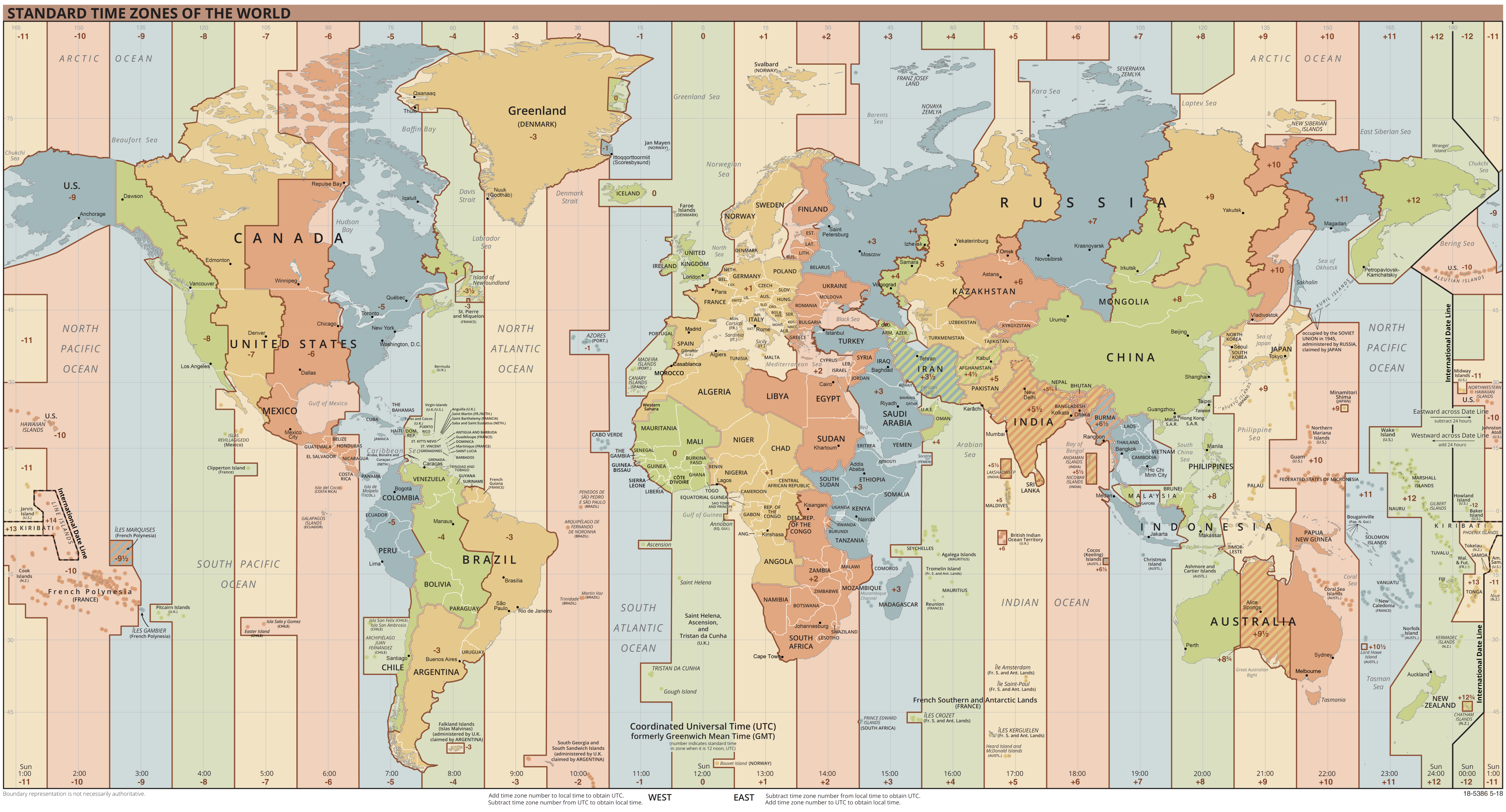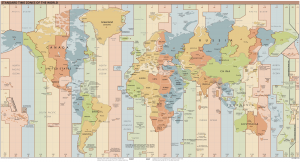*If you already read Parts I and II of this article, skip down to where it says “UTC -5.”
Sports are generally fun. Reality is generally not as fun. Sports in the context of reality are fluctuating levels of fun and not as fun. Since I do not consider myself a masochist, I try to write fun stuff. And you know what’s fun? Making teams that are unlikely to exist, that are selected based on handpicked, whimsical parameters, and pitting them against each other.
After the wonderful writers at The Athletic went to the painstaking measures of projecting teams for Canada, the United States, Sweden, Russia, and Finland at the 2020 World Cup of Hockey, it was announced days later that the World Cup of Hockey is, at present, not happening. The 2014 Olympics feel like a decade ago, and meaningful international hockey does not look to be on the cards anytime soon. One cool concept introduced at the more relaxed 2016 World Cup was Team North America. Made up of the best 23-and-under players from the US and Canada, stars like Connor McDavid and Johnny Gaudreau joined forces to offer fans a glimpse into the NHL’s bright future. And with pieces being written recently by Sean McIndoe that aimed to field the best and worst teams possible using existing contracts, I started thinking. Thus, the Great Ice Hockey Time Zones World Cup was created.
National borders are so arbitrary, and yet we stage the biggest sporting events in the world (among other things) based on them. International hockey tournaments with NHL talent have always been played on tilted ice, with Canada winning three of the five Olympics in which players from the senior circuit have partaken. The US has closed the gap on Canada recently, but with Russia still developing talent using Soviet-era training methods and Finland, Sweden and others not quite having the depth to match the North American nations due to their smaller populations, it doesn’t seem that parity is nearby. It would be more intriguing to play a tournament with the people that celebrate New Years’ simultaneously with you. That’s right—forget national allegiances. On hockey’s biggest stage (soon—trust me), the sport’s foremost superstars will be suiting up for teams like “Coordinated Universal Time (acronym UTC—no idea how) negative six.” If you weren’t always friendly with middle school geography, here’s a map of the time zones.
The appeal is simple—we’re trying to break up the Canadian juggernaut by taking advantage of how much sheer landmass the True North spans, but we’re giving them the American studs directly south to add star power. Fortunately for us, the time zones in Canada are actually pretty nicely split down the borders of the provinces, so that sense of hometown pride will burn extra strong. I thought that we would run into an issue with the Scandinavians. Fear not, though—Sweden and Finland are actually in different time zones as well! The Finns do get the short end of the stick in that Sweden is aided by nations such as the Czech Republic in UTC +1, while Russia has no players of note until UTC +3, leaving our small but mighty nation of some five million stuck in the middle in UTC +2.
A conditional: it may have gleefully occurred to you, “Oh boy, Russia is SCREWED!” The world’s largest nation by landmass has already been struggling to churn out top young talent relative to previous levels for a few years now, and it spans eleven f*cking time zones! To level the playing field, I split Russia in two—Russia West will be the players hailing from UTCs +3 and +4 near Europe, while Russia East will be comprised of the legends in UTC +5 and east—from basically Siberia to holy-shit-that’s-actually-still-Siberia.
Finally, tragically, it is with much grief that I share with you that neither Sidney Crosby nor Nathan MacKinnon—probably two of the best five players in the world—will be part of this exercise. Both grew up in the province of Nova Scotia in Canada (population 950,000, UTC -3). There have only been a few dozen NHL players from Nova Scotia in history, and there are less than ten active players. Plus, if I added UTC -3 players to the UTC -4 team, well, this really wouldn’t be a contest at all. Other than that, however, one of the attractive features of the GIHTZWC is that every top player in the world besides Crosby and MacKinnon are on a squad. Players that generally wouldn’t get a chance to really compete for a medal, like Frederik Andersen of Denmark and Leon Draisaitl of Germany, will be surrounded with the types of teammates that will have them playing every match-up tight.
Global time zone supremacy is on the line. As a resident of UTC -4 (Eastern Standard Time) my whole life, I’m finally ready to lord over the hockey universe, with a little help from McDavid and John Tavares. Let’s break down the teams—lineups, strengths, weaknesses, and more—and find out where the best distance to live from the Prime Meridian is once and for all!
UTC -5 (Manitoba, US Central Time)

Notable Omissions: Travis Zajac, Derek Stepan, Alex Galchenyuk, Jake Gardiner
This is a surprising example of a team that, top to bottom, looks fantastic, but is then undone by their situation in net. As we move east, I had to leave off some established, productive NHLers for the first time due to the depth of the -5ers. However, the Craig Anderson-James Reimer combination is simply a glaring wart the team can’t do much about.
Still, there’s a lot to get excited about on this team. There is an incredible amount of skill across all four forward lines, with grizzled veterans (Toews, Pavelski, Parise, Kessel) and young guns (Boeser, Guentzel, Keller) alike. It speaks volumes about a team when Anders Lee, who scored 40 goals in 2017-18, can only see fourth-line minutes.
The -5s defense is formidable, with two Norris Trophy candidates in McDonagh and Jones teaming up on the first pairing. Big-bodied vets Suter and Byfuglien are still more than capable to take on 23-plus minutes, while the undrafted Nate Schmidt’s Cinderella story continues as he sneaks onto the third pairing ahead of two-time Norris Trophy winner Duncan Keith, giving us an All-Yankee back end.
What’s impressive is the American presence on the team. We have eight Minnesotans, which is unsurprising, but get plenty of help from other markets, including Wisconsin (Pavelski, Kessel, Suter) and Illinois (both goalies). The real kicker: three of the most promising -5 players—Guentzel, Keller, and Seth Jones—were born in Nebraska, Missouri, and Texas, respectively. Seth’s father, Popeye, was suiting up for the Dallas Mavericks when Seth was born. Playing in Denver five years later, Popeye ran into Colorado Avalanche star Joe Sakic, and asked him what Seth could do to develop his hockey skills. Some 13 years later, Popeye’s son was selected 4th overall by the Nashville Predators in the 2013 NHL Draft. The elephant in the lineup is the goaltending situation, with both Anderson and Reimer struggling this season.
This team is as strong as any that we’ve seen to this point—until we factor in goaltending. So often underdog teams ride a hot netminder to the medal podium in these types of tournaments. Just look at Finland winning gold behind Ukko-Pekka Luukkonen at the World Junior Championships a few weeks ago. Not that the immense quality of the -5s’ lineup will keep them from contending, but it looks very unlikely that they’ll win gold backstopped by Anderson or Reimer.
But what about all the other great time zone-based teams? I will be breaking down the whole world of hockey over the next few days, so make sure to visit the Georgetown Voice for updates. Next on the list is UTC -4 (Ontario, Quebec, US Eastern Time). Who will be placed on this team? How good will they be? Check back in tomorrow to find out.




[…] The Great Ice Hockey Time Zones World Cup: UTC -5 The Georgetown Voice […]
[…] The Great Ice Hockey Time Zones World Cup: UTC -5 The Georgetown Voice […]